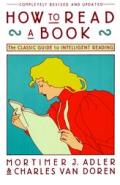
I have been broken.
Last summer I began reading How to Read a Book, The Classic Guide to Intelligent Reading by Mortimer J. Adler and Charles Van Doren. I've read 238 of its 346 pages (not counting the reading list and exercises and tests at the end). I've decided to throw in the towel because life is just too short.
Clearly, intelligent reading is beyond me.
One of the things the authors suggest readers do is write in their books. I'm totally with them there. In the front of my copy of How to Read a Book I wrote out the fifteen (that's 15) steps to reading a book. In addition, I wrote out the four questions to ask about a book, the four ways to look at words, and the four ways to look at facts. (My notes also say these are also the four aspects of encyclopdias.) The last 100 pages must have had more lists, but since I can't remember the ones I wrote down it seems unlikely that I would have gained anything from reading and writing down the rest of them.
I found How to Read a Book repetitive. It also used long analogies that increased the verbiage.
Quite honestly, I only remember those points because I wrote them down along with all my lists.
How to Read a Book was originally written in 1940 and the last copyright date is 1972. It's very dated, and not just because the authors keep referring to readers as "men."
My own faithful readers (the ones who are still with me since yesterday) will recall that I just wrote about the large number of books being published today. Far, far, more books are being published now then when How to Read a Book was being written or even when it was being revised. While many of the individual steps Adler and Van Doren suggest are worthwhile, it just isn't practical for readers to keep a couple of dozen tasks in mind while trying to keep up with today's load of reading.
At one point, Adler and Van Doren suggest which steps to keep in mind while reading a book for the first time. Other steps are saved for subsequent readings.
Subsequent readings????
Okay, sure, researchers planning to write a scholarly work better read their texts more than once. But the rest of us? Let's face facts. It's just not going to happen.
It's very possible that I could use some advice on how to read a book. I couldn't get through this one, after all. But I need that advice to be readable and practical and relevant to the situation I find myself in--"so many books and so little time." That appears to be a much different situation from the one that existed when Adler and Van Doren were writing their book.
3 comments:
Oh, I gave up on this one too! But I don't think I got anywhere near page 238.
I had a hard time accepting that I couldn't read a book about reading. Then I got to a point where I wanted to be able to say I'd read it.
Now I just want the whole thing behind me.
We have recently made an exciting discovery--three years after writing the wonderfully expanded third edition of How to Read a Book, Mortimer Adler and Charles Van Doren made a series of thirteen 14-minute videos on the art of reading. The videos were produced by Encyclopaedia Britannica. For reasons unknown, sometime after their original publication, these videos were lost.
When we discovered them and how intrinsically edifying they are, we negotiated an agreement with Encyclopaedia Britannica to be the exclusive worldwide agent to make them available.
I cannot over exaggerate how instructive these programs are--we are so sure that you will agree, if you are not completely satisfied, we will refund your donation.
Please go here to see a clip and learn more:
http://www.thegreatideas.org/HowToReadABook.htm
Post a Comment